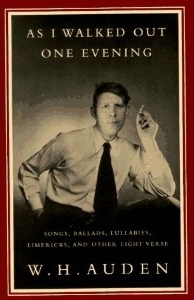W.H. Auden is famous for poems about totalitarian evil, but he also wrote frivolous verse when in the mood. In assembling As I Walked Out One Evening, Edward Mendelson, the executor of Auden’s estate, sifted through the vast corpus of his work, picking out “lullabies, limericks, and other light verse” (to quote from the front cover). Auden honed his craft with dirges such as “Spain 1937” and “September 1, 1939,” but the poems collected here employ short, epigrammatic couplets and acerbic bits of dialogue. Declaring early in the volume that “I hate . . . all authority,” Auden ridicules its manifestations in modern life: big business, public education, the military state. Auden’s Marxist leanings are evident throughout. In a typical entry, “‘Gold in the North’ Came the Blizzard to Say,” he traces the careers of five young men during the Depression. Typical is the fate of a neophyte stockbroker, who says: “In the streets of New York I was young and swell, / I rode the market, the market fell, / One morning I woke and found myself in hell.” Other entries, such as “Refugee Blues” and “James Honeyman,” deal with the plight of people who are of no use to the state bureaucracy (“If you’ve got no passport you’re officially dead,” a refugee is told). These poems are clever, but the centerpiece of the volume is the “Letter to Lord Byron,” a 40-page discourse on polities, sex, Auden’s life, and other assorted topics. Auden expounds upon a few of the developments in art and society that followed the Romantic age, praising the advent of modernism and condemning corporate rapacity. Although the poem is politicized—at one point Auden quips, “Today, thank God, we’ve got no snobbish feeling / Against the more efficient modes of stealing”— he also presents real insights, as in this description of the effects of television and advertising on the public mentality: “We’re growing up and up indeed. / Advertisements can teach us all we need; / And death is better, as the millions know, / Than dandruff, night-starvation, or B.O.” (If you compare Auden to the political poets of today—June Jordan and Adrienne Rich—his brash Marxism starts to look appealing.) He discusses the emergence of the novel as a form of popular culture and the sudden popularity of innovators like Louis MacNeice and Wyndham Lewis, the “sobering few / . . . trying hard to think of something new.” This volume may jolt readers familiar with the serious Auden, but it is an entertaining romp.
[As I Walked Out One Evening, By W.H. Auden, Edited by Edward Mendelson (New York: Vintage) 220 pp., $12.00]

Leave a Reply